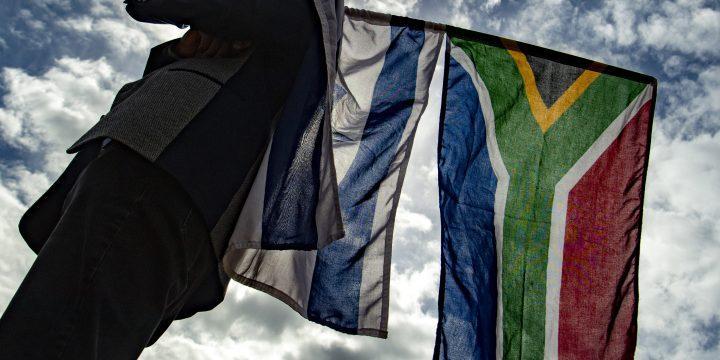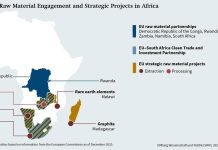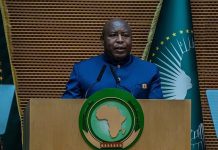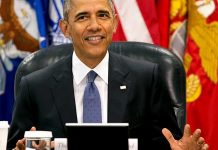Africa-Press – Mauritius. is currently circulating in Cape Town. It targets the DA and the PA on the basis of what are felt to be inadequate stances from the parties towards the current bombing of Gaza by Israel — and the violence of the sentiment sums up the depth of feeling in fairly significant pockets of Cape Town when it comes to the attitudes of local political parties towards the war in Gaza.
Though the conflict is raging more than 8,000km away from the Western Cape, the intensity of the reaction in the province should not be underestimated.
Here, many people find the position of the Palestinians deeply resonant, in terms of race, in some cases a shared religion, and a shared history of dispossession.
But outside of protests attended by tens of thousands of Capetonians — and many feel that the media routinely undercounts the number of protesters — the political debate around Gaza is increasingly moving away from mainstream media, as outlets find the volume of the discussion and its blowback impossible to manage.
The Sunday Times recently announced in an editorial, for instance, that it would no longer be accepting commentary on the war, on the grounds that it was drowning out domestic issues. National elections are, meanwhile, just six months away.
And though it is highly unusual for South African voters to make international affairs key issues in domestic elections, some feel that this particular topic just might be an exception. Smaller parties aiming to eat DA’s lunch on the matter
“The majority of Capetonians are not necessarily agreeing with the DA’s position on Israel,” believes Rod Solomons, a longtime community activist and the convenor of the SA1st lobby group.
“Once that voter is in that booth [for the 2024 polls] .
. it’s very, very early days to make a definitive pronouncement. But many people are hoping that [the Israel issue] will play a big role [in electoral outcomes]. ”
Solomons is working together with former ANC Western Cape leader Marius Fransman, suspended from the ANC in 2016 over sexual assault allegations, on a “People’s Convention” to be held in December to bring together people “inside civil society formations and outside of active politics” to discuss whether to launch a political entity to contest the 2024 elections.
Although the ANC in the Western Cape has all but collapsed, there are multiple smaller parties and organisations in the province champing to take a bite out of the DA’s electoral majority next year.
In the Israel-Hamas war, they may have found a wedge issue. Pro-Palestine feelings run particularly high in Cape Town’s Muslim community, but on the Cape Flats more widely the Palestinian solidarity movement is also strong.
A Social Research Foundation survey into South African attitudes towards Israel, published in November, found that 60% of surveyed coloured people — a percentage vastly higher than for any other race group — “strongly agreed” with the statement: “The government of Israel practises Apartheid policies against the people of Palestine.
” Just 3% of surveyed coloured people “strongly disagreed”.
On 28 November, a media platform called Cape Flats Stories — boasting almost 230,000 followers — hosted a dialogue on Palestine and Israel in which representatives from a range of local political parties and activist groups were expected to nail their organisations’ colours to the wall when it came to the war. From some, there was no equivocation. “It’s a genocide,” declared Al Jama-ah’s Shameemah Salie.
Neil de Beer, a former apartheid operative-turned-Umkhonto-weSizwe- agent-turned-leader of a party called the United Independent Movement, which is a member of the Multi-Party Charter, said that he was drawing on his personal experience of conflict situations in saying that Israel was violating the rules of war.
“Israel must now stop, and withdraw, and reach consensus on international law,” De Beer said. Other politicians attempted more of a diplomatic egg dance.
Jerome Swartz, previously a provincial ACDP leader who has since established the Africa Restoration Alliance, said his party was not concerned with international issues.
We are not running for government for Palestine,” Swartz maintained. After being forced to declare a position, he settled on: “Israel and Palestine are both wrong.
Pagad’s Cassiem Parker told the audience that what was happening in Gaza should be viewed as an “acid test” for SA political parties in terms of their response to racism.
“If you say to us you are more worried about what is happening in South Africa, then our acid test is: How can you tell us you are concerned if you are not concerned by racism? Surely, people of South Africa want to know: How do you as a political party view racism?”
Clarifying the “One bullet for the DA, one bullet for the PA” slogan, Pagad national coordinator Haroon Orrie said it was meant symbolically. “The concept and the ideology that they bring forth, that is what we have to eradicate.
” But the greatest heat of the night was certainly on Yusuf Mohamed, representing the DA as a councillor in the City of Cape Town.
“My position is exactly the same as my party’s,” Mohamed stated.
Namely: a call for a “cessation to hostilities”, the right of return for Palestinians, a two-state solution, and agreement that “carpet-bombing” civilians is a war crime.
External observers may be confused by the anger directed at the DA on this issue. The DA has not, after all, refused to criticise Israel — as is the case with the Patriotic Alliance.
Indeed, the DA’s stance is relatively progressive by international (at least US) standards. But its condemnation of Israel, such as it is, has often been syntactically obfuscated in the statements the party has put out on the matter.
To give one such example: “We recognise the way in which actions of the Israeli government, including the expansion of settlements deemed illegal under international law and, in some instances, by the country’s own Supreme Court, has contributed to obstructing the path to peace.
” The party has also faced internal contestation on the handling of the issue.
Daily Maverick understands from party insiders that the refusal of DA leaders to call plainly for a “ceasefire” has been a source of contention for multiple party representatives.
Instead, the DA has called for “urgent humanitarian pauses in the fighting” — a distinction which might seem semantic, but is significantly weighted in the context of the current debate.
Asked by Daily Maverick this week why the DA does not endorse a total ceasefire in the conflict, the party’s spokesperson on international relations, Emma Powell, responded: “The DA has repeatedly called for an urgent resolution to this abhorrent war.
This requires a negotiated settlement that will ensure lasting peace in the region. ” This has not been good enough for those both within and outside the party for whom the conflict rings very close to home.
One was the former DA spokesperson on public enterprises Ghaleb Cachalia, who was relegated to the parliamentary back benches as a result of tweets he posted describing Israel’s actions in Gaza as “genocide”.
The argument from party leadership was that Cachalia had violated “a formal decision of the DA’s national caucus” as to what the party’s public stance on the matter would be.
Cachalia declined to comment on the matter to Daily Maverick this week. Since his demotion, however, Cachalia has published an op-ed in Business Day in which he affirmed the “special significance” of freedom of expression for parliamentarians.
Although the column was not targeted in any specific way at the DA, Daily Maverick understands that party leadership was unhappy with it. Cachalia’s treatment has not gone unnoticed in the Western Cape and has seemed to pour petrol on the already existing resentment over the DA’s positioning on this matter.
A few common themes come up repeatedly in conversation: a belief that the DA is pandering to a few Zionist donors at the expense of its all-important brown voters; a sadness that there is not greater solidarity from both the DA and the Western Cape’s white population on this issue; and a suspicion that the DA’s current position represents a modulation, with an eye on elections, intended to balance a history of more explicitly pro-Israel positions that are not easily forgotten by Cape Flats voters.
A sign of the atmosphere of mistrust: rumours and misinformation are spreading like wildfire on social media. Most recently, the claim went viral that the City of Cape Town had prohibited Bo-Kaap residents from painting pro-Palestine murals on the external walls of their homes.
The city said that no such prohibition had been issued. The DA’s Powell told Daily Maverick that the party had undertaken polling which found “the war does not appear to be a priority that is impacting our polling results.
“Our experience, borne out by the empirical results of field polling and focus groups, indicates that voters remain primarily concerned about the effect of the many domestic crises which affect their daily lives.
These are unemployment, load shedding, crime, education and corruption. ” The Social Research Foundation report on South African attitudes to Gaza at least partly bears Powell out.
Of supporters of the ANC, DA and EFF, DA voters were the least likely to “strongly agree” that Israel is imposing apartheid policies against Palestinians. Of the three biggest parties, DA supporters were the most likely to “strongly disagree”.
The six months until the 2024 elections is a long period in South African politics, and past research suggests that when voters are at the polls, what predominantly motivates them are issues much closer to home.
The other question is: If Western Cape voters currently threatening to break faith with the DA over this issue actually do so, where will they go? Parties trading specifically in provincial identity politics, like the National Coloured Congress, have previously failed to make a discernible impact.
The Muslim party Al Jama-ah may pick up some votes, but off a very low base: it currently has just one representative in the Western Cape legislature.
Patricia de Lille’s Good party has adopted a much stronger pro-Palestine attitude than the DA, but De Lille’s position within the ANC Cabinet of Cyril Ramaphosa may well be mistrusted. There is, at this time, no clear beneficiary of a Western Cape electoral protest against the DA.
It is also too early in terms of international politics to tell exactly how the Israel issue will make itself felt in other countries — but there is no doubt that the matter is roiling domestic politics in many countries.
In the UK, the conflict could not have broken out at a worse time for the opposition Labour Party. In its strongest position for years, it has since lost more than 30 councillors to resignations over its refusal to call for a ceasefire in Gaza, while no less than eight shadow ministers quit in mid-November.
For More News And Analysis About Mauritius Follow Africa-Press







